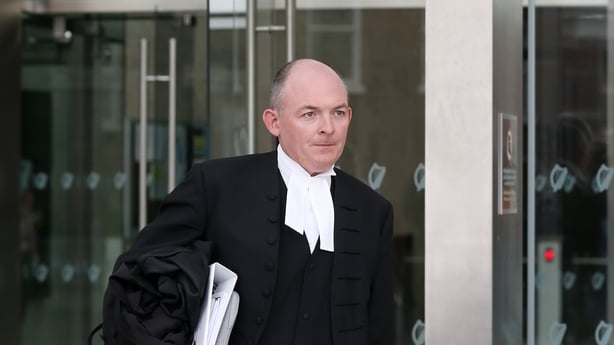The Israeli Embassy in Dublin has tonight said Taoiseach Simon Harris's calls for a review of trade deals with Israel "will achieve nothing but souring further the two countries bilateral relations".
A spokesperson for the embassy said Israel was aware of "statements and actions taken by the Irish Government" and said that it believes there is a "rise in anti-Israeli rhetoric" that is "bordering on vilification".
It was in response to Mr Harris's confirmation that he has asked the Attorney General Rossa Fanning to review trade deals with Israel.
The statement reads in full: "We keep following statements and actions taken by the Irish government which will achieve nothing but souring further the two countries bilateral relations.
"We follow with dismay the continued rise in anti-Israeli rhetoric and actions bordering vilification of Israel.
"This tragic war was launched by Hamas and is being perpetuated by Hamas, which still holds in captivity over a hundred Israelis while at the same time abusing its own population.
"Israel is facing an enemy committed to its annihilation, it's unfortunate that the Irish Government prefers to ignore basic realities.
"In its fight against terror orchestrated by Iran, Israel is committed to international law and the rules of war, while fighting a genocidal enemy."
Trade deals are usually an EU competency, meaning they are the responsibility of the political and economic bloc as a whole rather than an individual member state.
This EU competency clarity was underlined during the Government's opposition to the recent Occupied Territories Bill in the Dáil.
Mr Harris said that he has made the decision to seek "fresh advice" on the issue after the International Court of Justice ruling last month that, in its view, Israeli settlements in Palestinian territories breach international law.

"Today in light of the International Court of Justice ruling earlier this summer, I have written to the Attorney General to ask for fresh advice in relation to the broader issue of trade - trade at EU level, at Irish level, and where the competencies lie.
"And if anything has changed in relation to previous legal advice as a result of that ICJ ruling," he said.
"I've always said consistently that it's really important that all countries and indeed the EU use all levers at their disposal to bring about a ceasefire," the Taoiseach said.
The Taoiseach said he believes there could be a way to allow Ireland to make its own decision on trade, and that he would like the Attorney General to clarify if this is the case.
"I think it's important to say that when people say 'well hang on you were able to do this on defence why are you not able to do this on other areas', that is a fair question to ask and it is appropriate that the Government seeks an answer for the people of Ireland in relation to that. That's what I intend to do," he said.
When asked for a timeline for when the Attorney General may respond, the Taoiseach said "I don't yet know, I've written to the Attorney General today and I expect to hear back in the coming days".
His reference to defence was in relation to the announcement by Tánaiste and Minister for Defence Micheál Martin yesterday, saying Ireland will cease the purchase of military equipment from Israel, as this is allowed by individual member states under EU rules.
Mr Harris said today that the Tánaiste spoke with him about the decision on the purchase of Israeli military equipment before making the announcement after an EU foreign affairs council informal meeting in Brussels yesterday.
The decision to cease the purchase of military equipment from Israel was discussed among the three Coalition party leaders.
Green Party leader Roderic O'Gorman said Mr Martin discussed the decision to cut ties with Israel in terms of providing military equipment with him and the Taoiseach.
However, when asked if it was a Cabinet decision, he would only say he was "aware" of the decision and that it was discussed with him and Mr Harris.
Speaking on Morning Ireland, Mr O'Gorman said Mr Martin always works within legal advice, and always gives very clear consideration to issues.
"I have full confidence that the Tánaiste is working within the legal advice available to us, because the Tánaiste has worked very closely with the Attorney General in terms of the legal proceedings in the [International] Court of Justice that would have been the basis of this decision".
Asked about reports that aircraft carrying weaponry from the United States to Israel have flown through Irish airspace, Mr O'Gorman said that in terms both of the individual company and the Israeli government, the Government "will have to take strong action."
"We cannot see our airspace being used for the transport of munitions that are going to be used in the war in Gaza.
"Strong action means bringing in the Israeli ambassador, and if it is proven that these flights take place, making it very clear that actions that aren't in compliance with international law in terms of the use of our sovereign airspace won't be tolerated by the Irish Government".
Mr Martin has said the ICJ’s advisory opinion on Israel's illegal occupation of the Palestinian territories placed obligations on member states in the European Union and the EU itself on how it conducted relations with Israel.
He said that "Ireland domestically will have to take that into account as well in terms of our relationship in respect of the illegal occupation."
Essentially, he said, this means Ireland cannot engage in activities that further the illegal occupation.
"Not all aspects of trade, but certainly, for example, there has been speculation about procurement of military activity ... that sort of thing will not happen. We will not be procuring military equipment or defence equipment, or contracts with Israel."






